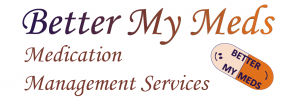BetterMyMeds – Transforming Pharmacy Practice
Betty Chaffee/ September 26, 2019/ Uncategorized/ 3 comments
 You may have wondered what makes BetterMyMeds different from other pharmacies in the community. All pharmacies employ pharmacists with lots of education, knowledge, and a passion to help others, right? You bet they do. Most pharmacists go into the profession because they see it as a way to help people. Pharmacists spend years in school learning how medications work, and what problems people can run into when they take them. We learn how to educate both patients and doctors so that people can get the health benefits they expect from their medications.
You may have wondered what makes BetterMyMeds different from other pharmacies in the community. All pharmacies employ pharmacists with lots of education, knowledge, and a passion to help others, right? You bet they do. Most pharmacists go into the profession because they see it as a way to help people. Pharmacists spend years in school learning how medications work, and what problems people can run into when they take them. We learn how to educate both patients and doctors so that people can get the health benefits they expect from their medications.
What makes BetterMyMeds unique?
If it's not the knowledge, education, or passion, what makes the difference? It's all in the business model. Most pharmacies require pharmacists to focus on filling prescriptions. That's a big and important job on its own - checking every prescription to make sure the medication and dose is right for the patient, that it's covered by insurance or substituted with a covered generic equivalent. Calling insurers to get preauthorization so it's affordable. These tasks and others are essential to providing patients with prescriptions that are filled accurately and safely. And they take a lot of time.
In the end, the focus on filling prescriptions is made such a high priority that everything else has to take a back seat. As much as a pharmacist might want to spend time talking to his or her patients, the workload may make it impossible. Without question, if a patient has a concern, the pharmacist will find time to answer it. But routine education and counseling simply can't be done.
BetterMyMeds stands out because we take the opposite approach. The knowledge and expertise of pharmacists has been hidden for too many years - it's time to bring pharmacists back out to the patients, where we belong! Our focus is on education and counseling, and we do that to the complete exclusion of filling prescriptions. With Medication Management, patients can get more value out of the medications they purchase and take everyday.
 BetterMyMeds was recently featured on the Lucy Ann Lance show, airing on WLBY AM radio in Ann Arbor. She asked insightful questions - why I founded this business, what makes it different, and why its mission is so important to the health of patients. Listen to the interview here, and learn how BetterMyMeds can help you!
BetterMyMeds was recently featured on the Lucy Ann Lance show, airing on WLBY AM radio in Ann Arbor. She asked insightful questions - why I founded this business, what makes it different, and why its mission is so important to the health of patients. Listen to the interview here, and learn how BetterMyMeds can help you!


On television, we see the long list of possible side effects of taking medications. It’s scary to the point that I would live with a condition rather than risk becoming a victim of a side effect. It would seem that once we start taking medications, we will continue to take medications for the rest of our lives to combat the problems caused by previous medications. Our bodies are chemical machines, When something comes out of balance, I would think that the problems should be able to be solved with a controlled diet. Can this happen?
Tony,
It would be great if diet or other lifestyle choices were always the answer. But unfortunately that’s not always the case. Take type I diabetes, for example, where the pancreas just stops making insulin. Or heart disease in those who eat a balanced diet and exercise routinely. While lifestyle choices can have a positive effect on many of the common problems people have, they don’t always completely resolve the problem. That’s where medications can help. And you’re right, if meds aren’t used carefully, they can pile on. That’s why the eye of a pharmacist is so valuable!
I concur with Betty on this topic. A healthy lifestyle that includes regular amounts of aerobic physical activity and a healthy diet does tend to reduce the risks of some health conditions, thus potentially reducing the needs for some medications. However, there are often other factors involved that a person has very little (if any) control over. These factors would include hereditary factors, presence of genes that put one at greater risk of diseases, injuries, allergies, environmental stressors, congenital heart disorders, neurotransmitter imbalances, glandular disorders, etc… Additionally, sometimes a physician may consider diet and exercise to be a long-term solution, yet may consider the patient to be at immediate risk for harm or complications without medication intervention. So as Betty mentioned, this is when the training and knowledge of a pharmacist becomes so valuable to reduce risks of drug-drug or drug-disease interactions, assess how well the patient is responding to therapy, and even recommend discontinuation of suboptimal or unnecessary medications.